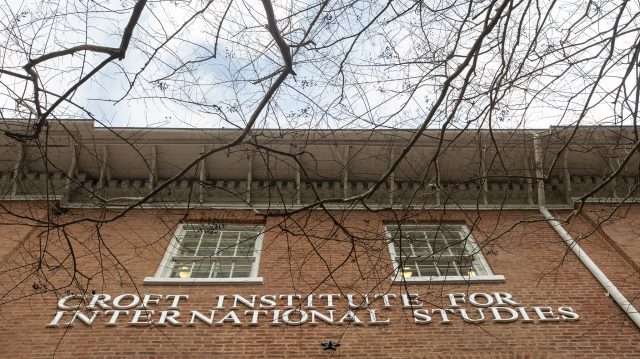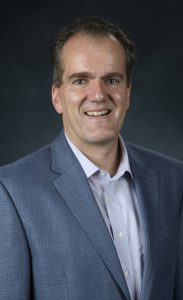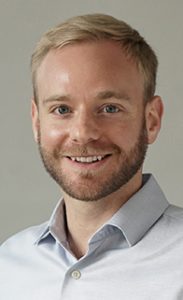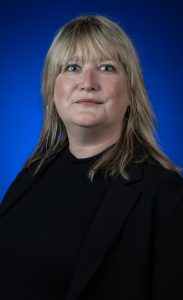
The Croft Institute for International Studies is celebrating the 25th anniversary of educating global citizens. The institute, founded in 1998 with a $60 million donation from the Joseph C. Bancroft Charitable and Educational Fund, focuses on language learning and teaching students to navigate an increasingly interconnected world. Photo by Sri Chattopadhyay/Ole Miss Digital Imaging Services
OXFORD, Miss. – Before the widespread use of cellphones, social media and Google, the founders of the Croft Institute for International Studies dreamed of a program that would teach University of Mississippi students how to be global citizens.
As the Croft Institute celebrates its silver jubilee, Executive Director Oliver Dinius said many things have changed in the past quarter-century, but one thing has remained the same: the dream of educating students to thrive in an international, interconnected world.
Since the institute’s founding in 1998, the world has changed, Dinius said. Whereas students once spent hours in libraries, they now have libraries rivaling Alexandria in their palms. Where once there was a dream of an interconnected world, that dream has become a reality.
That change means that the institute’s goal of teaching students how to live and work in a globalized world is more important than ever.
“There really is no place in the world like Croft,” Dinius said. “The institute is built to address the lack of options for education that shows students the world of international exchange. That’s what we do.”
Croft’s anniversary celebration begins at 2:30 p.m. March 24 in Croft Institute, Room 107, with the official ceremony. Croft alumni will speak to current students about their careers from 3:45 to 5 p.m. A reception is set for 6 p.m. at the University of Mississippi Museum.
On Saturday, the institute’s porch will be open at 11 a.m. for a tailgate before the Ole Miss baseball game vs. Florida.
The celebration is also a time to reflect on the institute’s past and set goals for the future, Dinius said.
International Thinking
In 1996, Gerald M. Abdalla walked into then-UM Chancellor Robert Khayat’s office in the Lyceum and said the unimaginable: “I want to give you $60 million.”
Abdalla, CEO and president of Croft LLC and chairman of the Joseph C. Bancroft Charitable and Educational Fund, said Bancroft would set aside a sum of money to fund education in the state. Two years and many conversations later, that donation – the largest in the university’s history – was used to set up the Croft Institute for International Studies.
“The goal was to open up the world to Mississippians,” Dinius said. “They had a very clear vision of what Croft would be. The basic concepts were very strong language learning, interdisciplinary studies, a collective student-centered identity and an international view of the world.”
The first cohort was only 40 students. Over the next 25 years, that cohort size grew incrementally to 75. Small classroom sizes and intimate relationships among faculty, students and alumni are part of what makes a Croft education special, alumnus Joseph Bateman said.
“The main draw for the Croft program was that you could have the experience of a small liberal arts college inside of a large university,” said Bateman (BA 10), director of impact investing at Social Finance in Washington, D.C. “Most of my classes were 10-20 people, but I had the resources of a large public university.”
Those small class sizes led to close relationships with Croft professors, whom Bateman said supported him throughout his academic career.
“I felt like I had advocates in my teachers that was not necessarily the same outside of Croft,” he said. “The faculty and staff encouraged us to be comfortable with being uncomfortable, whether that’s learning about things that are different or challenge your worldview, or being in a place where you don’t know the language.
“That’s something that served me well in my career.”
Community Culture
In the beginning, Dinius said, the institute offered three main international areas of study: Latin America, Europe and East Asia. Since 2011, the institute also has offered Middle Eastern studies. Overall, the almost 700 Croft alumni have learned one or more of 16 different languages and studied abroad in 51 countries across the globe.
Alongside rigorous courses, the institute also requires all students to study abroad and study a second language each semester. These difficult classes and international experiences build a sense of community, said Kate Centellas, Croft associate professor of anthropology and international studies.
“They’re growing together,” Centellas said. “They build an identity that lasts long after graduation. I’ve spoken to alumni from years ago who still call themselves Crofties.”
Centellas, who has also taught more than 45 Ole Miss students in Bolivia in the last 10 years through the UM Study Abroad Office, said the students’ time abroad helps them learn independence and to use the skills they learn in a real-world setting. Those skills continue when students come home.
“What do you bring back? How do we be global citizens at home?” Centellas said. “Just because you learn about the other places, that doesn’t mean you abandon where you came from. It means you understand it more broadly now, in the scope of the world.”
Teaching these skills is integral to a student learning to function in the international, interconnected world, she said.
“We can’t pretend that we live in a world where what happens across the globe doesn’t affect us,” Centellas said. “We have to have a better approach to global education, and Croft allows us to do that.”
Globalizing International Studies
The Croft Institute may have been ahead of the curve when it comes to globalization, but the world has caught up.
“This program is always trying to anticipate the next change,” Dinius said. “One of the goals now is to take the institute from international studies to global studies.”
Alongside offering the four main regions of study, Dinius said he plans to see the institute take a holistic approach to help its students to understand the world. That means focusing on subjects such as the environment, global health and migration to take a refreshed look at how the world connects.
For Reo Weaver, a senior international studies major in the institute, Croft was initially a gateway to connecting with his culture. Weaver, who was born in Iwakuni City in the Yamaguchi Prefecture of Japan, was raised in Southaven.
For the last four years, he has improved his understanding of Japanese and, for the first time, met his grandparents during his study abroad semester in Tokyo last fall.
“I wanted to be able to speak with my grandparents,” Weaver said when asked why he was interested in joining the Croft Institute. “I knew that I wanted to take Japanese and really master that, but being in Croft, it helped me understand what I want to take further.”
Weaver said his time in the institute helped him understand the world on a broader level – to understand the interplay of different cultures and communities.
“To be a citizen, you have to realize your actions could have an impact on the outside world,” he said. “That means it’s unfair not to understand the world around you. I think that’s what a global citizen is.”



